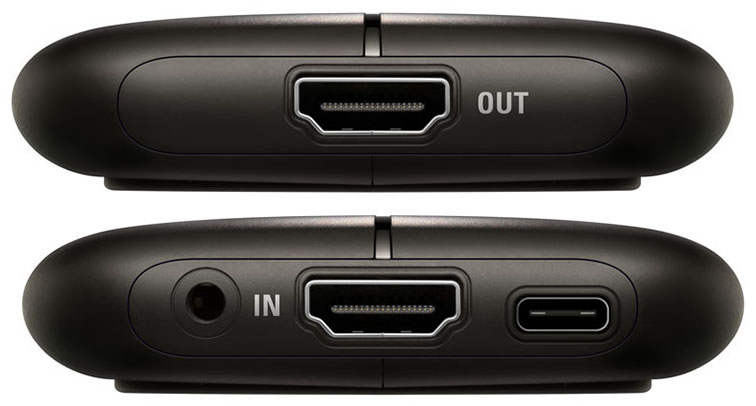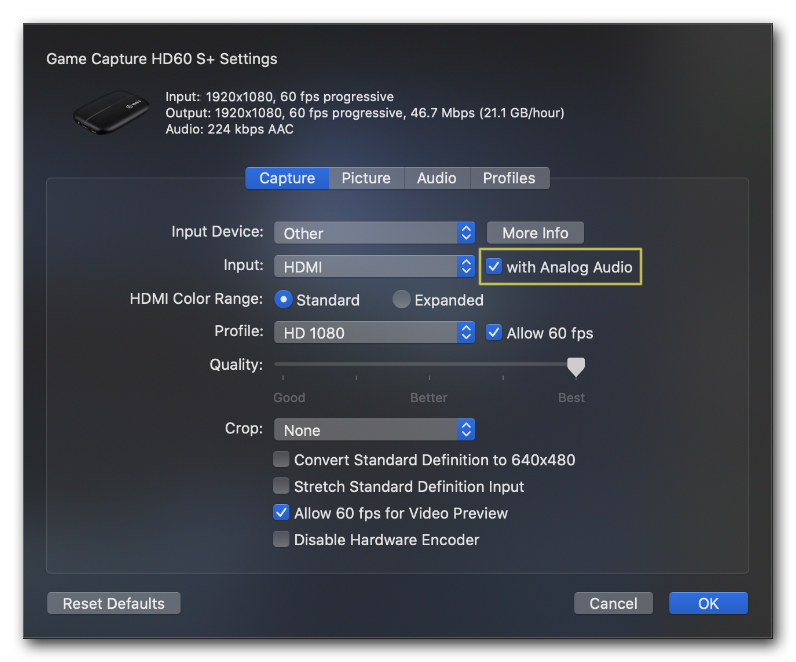

- #Setting up elgato hd60 drivers
- #Setting up elgato hd60 driver
- #Setting up elgato hd60 code
- #Setting up elgato hd60 license
Of course, you need to figure out the license issue first, if you're planning to publish your work. Nevertheless, I think you can find a lot of useful information there. It felt more like a legal court, rather than a few geeks making their beloved devices work under their beloved OS.

That is essentially the point, where I stopped working on this project: we had a very good, in-depth reverse engineering document, however we couldn't use it, due to the license we chose for our project. In order to protect himself, he has published the documents under the requirement, that derivative works are not allowed to be sold.Īs MIT license doesn't forbid selling (so doesn't GPL / LGPL) and I was already warned once by Elgato due to legal issues (before they were acquired by Corsair), I wasn't interested in further trouble. We had licensing concerns, as the laws in his country forced him to publish any reverse engineering efforts only under the requirement, of not making profit. I couldn't find the direct link (Google Drive link), but it should be in the group chat. We had a lot of in-depth analysis going on, including links to teardown articles (HD60, HD60 also went through the trouble of creating a reverse engineering document, which is pretty much on point. If you're new into this, I strongly advise you to read our group chat at going from 27th February 2017 onward (up until end of March). I'm gonna focus on Game Capture HD and HD60 (and maybe HD60 S) support. Chat with them about this, they might have interest and know-how. If you look around GitHub, you might come across projects like, which are managed / programmed by such people. That beeing said, there are lots of other developers out there, who enjoy writing in kernel-space and may be interested in your offer. One (or atleast I) constantly has to fight problems, which don't exist and waste lots of time. One is forced to write in a subset of C (which is limiting enough and slowing progress down) and debugging is a pain (faulty function? System crash -> reboot) - it simply is not fun for me. From my past projects, I've learned: writing in kernel-space is very limiting and time-consuming. While developing USB in user-space using libusb / hidraw / hiddev is very mature, easy and fun, PCIe development in user-space is not so there is no way around kernel-space.
#Setting up elgato hd60 drivers
I would need to start from absolute scratch - I could not reuse anything from this project, since PCIe drivers would force me to write in kernel-space. It's just that it's very time consuming and I'm afraid I don't have that much freetime on my hands - just beeing realistic here. This is not because I'm not believing in myself or it's impossible. I'm sorry for letting you guys wait and disappoint you, but I'm afraid I cannot make it happen.

#Setting up elgato hd60 driver
You can expect news about the Kickstarter project and during the past days, I've read about PCIe reverse-engineering and driver development and of course the HD60 Pro itself. I have lots of time on my hands over the weekend. I'm doing this for the community and I need your support. Lots of people are asking for it, therefore, I've decided to start a Kickstarter campaign to give you guys this opportunity. That beeing said, I have gained alot of experience in the process of reverse engineering the Elgato GCHD and I am sure, that I'm able to get the HD60 working under Linux aswell. The driver is extremely low-level and very specialized, therefore, there is no way for me to get the current driver working with the HD60, without having one for reverse engineering. The HD60 will need to be worked on from scratch, as a different hardware is used and different features are offered. If you change a single line of code, weird colors show up or the driver completely stops working.
#Setting up elgato hd60 code
Please note, that not even the new revision Elgato Game Capture HDs (non-HD60) are working with this driver, eventhough the differences are marginal.Ĭurrently, nearly 10k lines of code are needed, to set up the device (I'm sure, I can cut it down / refactor lots of parts, but ye, it's currently 10k).

The HD60 is a completely different device and therefore currently not supported by this driver.


 0 kommentar(er)
0 kommentar(er)
